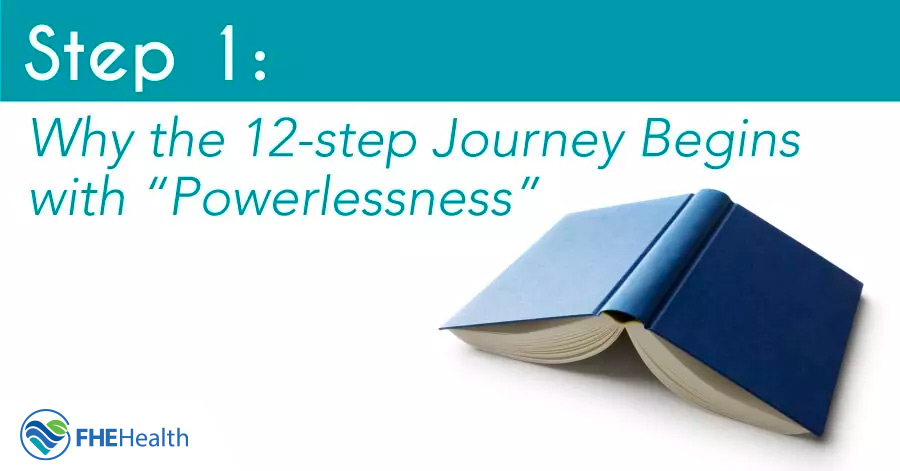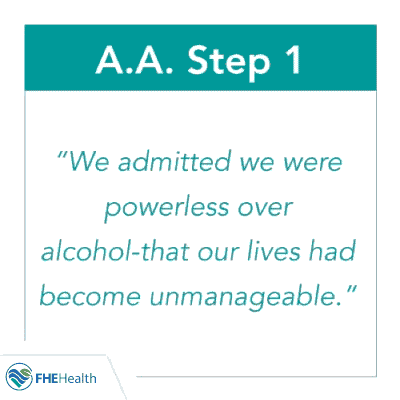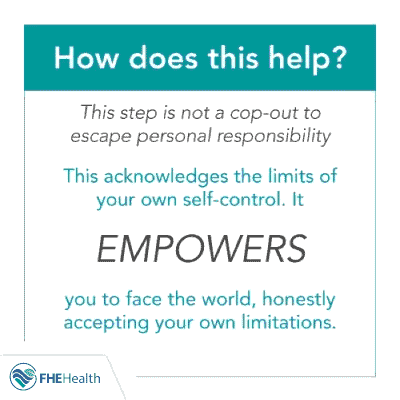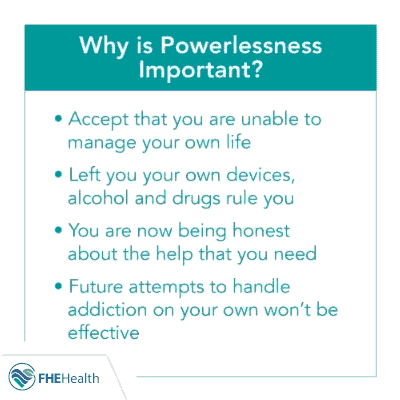
|
|
The journey to recovery often begins with a single step, and for millions of individuals battling alcohol and/or substance addiction through using a self-help pathway such as Alcoholic Anonymous, this first step is truly lives up to its name as it is the first step of several steps that are regarded as a program of recovery. This step asks an individual to acknowledge one’s powerlessness over alcohol or other substances. In the words of the authors of AA’s Big Book, “We admitted we were powerless over alcohol — that our lives had become unmanageable.”
In 1939, Bill W. and Dr. Bob S., the founders of Alcoholic Anonymous, published the first edition of “The Big Book.” In it, they outlined AA’s philosophy and methods for a peer-based recovery program for alcoholics based on the Twelve Steps of recovery.
Worldwide, alcoholics, addicts and treatment professionals embraced the Twelve Steps, and more than 35 million copies of AA’s Big Book have been distributed in over 70 languages. First developed specifically for people with alcoholism (now known as alcohol use disorder), dozens of 12-step programs are now available for a variety of use disorders including Cocaine Anonymous (CA), Gamblers Anonymous (GA), Medication-Assisted Recovery Anonymous (MARA) and Narcotics Anonymous (NA). Families can also find support in 12 step based self-help in groups such as Al-anon and Nar-Anon.
What is Step 1 in AA?
Step One of the AA’s Twelve Steps is, “We admitted we were powerless over alcohol — that our lives had become unmanageable.”
What is Admitting Powerlessness Over Alcohol or Drugs?
 Recognizing your powerlessness over alcohol isn’t a sign of weakness but rather an acknowledgment of the addiction’s strength. Many who struggle with alcoholism have tried to control or moderate their drinking, only to find themselves repeatedly falling into the same destructive patterns. Step One AA emphasizes the futility of attempting to manage something that’s proven uncontrollable.
Recognizing your powerlessness over alcohol isn’t a sign of weakness but rather an acknowledgment of the addiction’s strength. Many who struggle with alcoholism have tried to control or moderate their drinking, only to find themselves repeatedly falling into the same destructive patterns. Step One AA emphasizes the futility of attempting to manage something that’s proven uncontrollable.
Step One AA acknowledges that not only are you powerless over alcohol, but your life has also become unmanageable as a result. This unmanageability often manifests in various ways, such as deteriorating relationships, declining physical and mental health and a growing sense of despair. Recognizing this unmanageability is crucial because it propels individuals toward seeking help and making lasting changes.
It is important to note that unmanageability for one person, may seem completely manageable to another. For instance, a CEO’s unmanageability may look very different than a college student’s, yet they both can and do meet the description by looking inward and not comparing themselves to others. Hence the term “functioning alcoholic.”
Those who subscribe to the 12 steps of AA recognize that for most addicts, the AA first step is usually the hardest. Admitting you are powerless over alcohol requires a tremendous amount of courage, humility and even fear. It can bring on a flood of powerful emotions including shame, anger and grief. However, it can also be a tremendous relief.
Why Is Admitting Powerlessness the 1st Step in AA?
The founders of AA understood that for alcoholics to truly take ownership of their recovery, they needed to accept that their life had become unmanageable due to their addiction. Excessive alcohol use not only leads to more than 140,000 deaths nationally each year but can also cause lives to spin out of control. Provisional data from CDC’s National Center for Health Statistics indicate there were an estimated 107,543 drug overdose deaths in the United States during 2023
To admit powerlessness over alcohol (or drugs) means accepting the fact that you’ve lost control over your substance use. You accept that your life, either internally, externally or both, has been impacted by maintaining the use of a substance and this addiction has negatively influenced your thoughts and actions.
“Admittance as described in the first step, is very different from acceptance. Step one simply calls for admittance. Don’t be discouraged or feel that you don’t belong if you have some questioning or doubts in the beginning, ambivalence is often a part of the process. Just continue to follow through with the other parts of the recovery process such as the steps, self-reflection, therapy, connecting to the community or other recovery resources. You may find as you continue to work on yourself, that your insight and perhaps your acceptance, around this step will Increase over time.” – Joi Honer, Director of Alumni Services, FHE Health
Step One AA is fundamentally about honesty, while active addiction is characterized by denial. The ways one tells themselves and everyone around them “see I’m okay” when they most likely are not. Fully accepting step one is not always a straight path, but there is good news! The old belief that a person must fully accept themselves as powerless for the program to work has been challenged and tested. What research has discovered is that acceptance of this step should be centered on the person and what they believe is problematic. Acknowledging that, for many, feelings of ambivalence are a part of the process. That anyone approaching the need to change can benefit from the 12 steps regardless of the stage of acceptance that they are in. A person no longer must hit “rock bottom” to be able to engage in recovery. They can step out of the process at any stage by simply acknowledging they need help, even when they don’t exactly see all the places that this help is needed. Step one is a place to start.
Do You Have to Believe in God for 1st Step AA?
The original version of the Twelve Steps and The Big Book makes numerous references to God, and this is largely because the steps were based on the six principles of The Oxford Group, a religious movement. The original references to God were quickly challenged in the early days of AA, and Bill W. addressed those challenges by explaining that every member was welcome to interpret God to mean whatever higher power they chose to believe in while working the steps. Philosopher William James and Carl Jung a Swiss psychiatrist also played a part in supporting the concepts of a spiritual (not necessarily religious) experience as part of recovery.
Bill W. said, “In Step Two we decided to describe God as a ‘Power greater than ourselves,’ and in Steps Three and Eleven, we inserted the words ‘God as we understood Him'” to make the Twelve Steps nondenominational and meaningful for people of all faiths and beliefs.
The concept behind the references to God or a higher power in the 12-step program is to support addicts in the understanding that they need to find a source of strength that’s greater than themselves alone. This could mean God, a general belief system or the recovery community itself. Regardless of what addicts identify as their own personal higher power, it’s an expression that means they’re accountable to someone or something that’s bigger, more powerful and more influential than themselves.
Even if you don’t believe in God, you can still undergo the AA first step. In fact, Step One is an essential part of your recovery.
How Will AA First Step Help Me Recover From Addiction?
 Step One is often scrutinized by critics who claim the concept of addicts admitting that they’re powerless is a cop-out: a way to simply blame the alcohol or drugs for everything that had ever gone wrong in their lives.
Step One is often scrutinized by critics who claim the concept of addicts admitting that they’re powerless is a cop-out: a way to simply blame the alcohol or drugs for everything that had ever gone wrong in their lives.
While admitting powerlessness over a substance may seem at odds with efforts to hold addicts responsible for their behaviors, the opposite is true. By accepting that you’re powerless over alcohol, drugs or addictive behavior, you’ve come to terms with your personal limitations.
In essence, in Step One you’re making a conscious choice to recognize out loud you have a problematic relationship with substances. Step one asks you to identify out loud that you have continued to use substances despite this use impacting your life and or the lives of others negatively. This admission is the first step that will lead you on a path that will help you embrace the need to change, learn more about what led you to use substances in the first place, the thoughts and behaviors that your support this use and what you must do to achieve and maintain recovery. It is a beautiful paradox, that being “powerless” can ultimately empower one to make significant meaningful long-lasting change.
Questions to Ask Yourself in 1st Step AA
As you embark on the first step of your journey in Alcoholics Anonymous, consider asking yourself these questions to deepen your understanding and commitment:
- What role has alcohol played in my life, health and overall well-being?
- Have I ever tried to control or stop my drinking/drug use and failed?
- Do I recognize any patterns of unmanageability in my life because of alcohol use? Risky behavior? Breaking promises to self and others?
- Is my report of my alcohol use and consequences vastly different than those around me? How has this impacted my relationships?
- Am I willing to acknowledge that I’m powerless over a substance and that my life has become unmanageable as a result? (Acknowledging is a step toward the process of acceptance.)
Need Help With Alcohol Abuse? We’re Here for You
The AA first step, admitting powerlessness and acknowledging the unmanageability your addiction brings, is a crucial leap toward lasting recovery. It’s a moment of profound self-realization and humility, opening the door to hope, healing and transformation. Remember, the 1st step AA is not the end but the beginning of a brighter future. If you’re struggling with alcohol addiction or drug addiction, please contact us now at FHE Health for compassionate help and support.
Further Reading: See our articles on…
- Why the 12-step Program Still Works
- Step 1: Why the 12-step Journey Begins with Powerlessness (This Blog)
- Step 2: What is a Higher Power?
- Step 3: God as you Understand Him
- Step 4: Your Moral Inventory
- Step 5: Admitting Your Wrongs
- Step 6: Addressing Character Defects
- Step 7: Removing our Defects
- Step 8: Willing to Make Amends
- Step 9: Making Amends, How to Approach Step 9
- Step 10: Ongoing Inventory
- Step 11: How to Deepen Your Connection with a Higher Power
- Step 12: Sharing Your Spiritual Awakening With Others
- Understanding AA Lingo
- The Principles of AA







